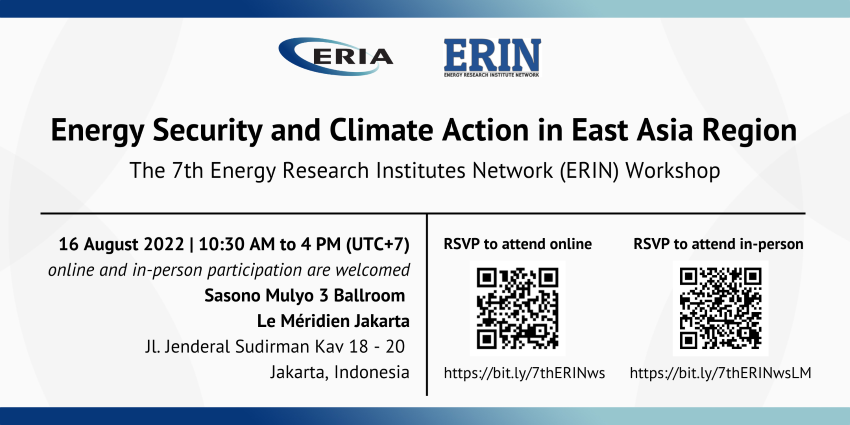The 7th Energy Research Institute Network (ERIN) Workshop: Energy Security and Climate Action in East Asia Region
Date:
16 August 2022Category:
News, Press ReleasesTopics:
Climate Change, Energy, WorkshopShare Article:
Print Article:
Jakarta, 16 August 2022: The Economic Research Institute of ASEAN and East Asia (ERIA) and the Energy Research Institute Network (ERIN) co-hosted the 7th ERIN Workshop ‘Energy Security and Climate Action in East Asia Region’ on 16 August 2022 at the Hotel Le Meridien, Jakarta.
The energy landscape has significantly changed since the onset of the conflict between Russia and the Ukraine. Prior to the conflict, climate action was at the centre of the energy debate with a range of ideas about how to increase renewable energy and reduce the use of fossil fuels. However, with energy prices further escalating due to the conflict and growing concerns about crude oil and natural gas supply shortages, interest in energy security has rapidly climbed to the top of the agenda. Investments in fossil fuels are essential to resolving the ongoing energy security crisis, creating a stark contradiction to long-term climate action. The world faces the difficult challenge of how to deal with strengthening fossil-based energy security while at the same time taking steps to combat climate change. Addressing this issue is essential for the economic growth of Asian countries. This hybrid workshop was organised with experts from Asia and other regions to discuss these challenges from multiple perspectives.
The workshop started with opening remarks by Prof Tutuka Ariadji, Director General, Directorate General of Oil and Gas, Ministry of Energy and Mineral Resources (MEMR), Indonesia and Prof Hidetoshi Nishimura, President of ERIA followed by welcome remarks by Dr Siti Indati binti Mustapa, Director of Institute of Energy Policy and Research, Universiti Tenaga Nasional (UNITEN), Malaysia and Co-Chairperson of ERIN and special keynote speeches by Prof Masakazu Toyoda, Senior Advisor of the Institute of Energy Economics Japan (IEEJ), Japan and Mr Prahoro Yulianto Nurtjahyo, Co-chair of the G20 Energy Transition Working Group, Ministry of Energy and Mineral Resources, Indonesia, Co-chairperson of the G20 Energy Transition Working Group (ETWG).
Session 1, moderated by Prof Basil M.H. Sharp, Professor, Chair in Energy Economics, Department of Economics, Faculty of Business and Economics, The University of Auckland (UoA), discussed the implications of the Russia-Ukraine conflict on short to mid-term energy security. Session 2, moderated by Moderated by Dr Asclepias Rachmi Soerjono Indriyanto, Chairperson of Executive Board, Indonesian Institute for Energy Economics (IIEE), Indonesia discussed how to align climate action with energy security in the EAS region. Session 3, moderated by Dr Siti Indati binti Mustapa, discussed necessary policies and initiatives for energy security and climate action in the EAS region following background presentation by Prof Tatsuya Terazawa, Chairman and CEO of IEEJ, Japan.
After the three panel sessions, the following key points were extracted;
- The global debate on decarbonization should recognize different circumstances between OECD countries and non-OECD (in particular Asian) developing countries. Asian countries should speak out more.
- Asian Countries have increased electricity demand to achieve their economic growths, thus accessible, available, and affordable electricity from thermal power plants will be necessary continuously in future.
- Thus, gas will take on an increasingly large role in the low carbon energy transition (coal to gas) and it will be a most probable pathway in Asia.
- However, current gas price hikes due to the Ukraine crisis could delay fuel switching from coal to natural gas.
- Limiting oil and gas consumption and shifting to affordable renewable energy (e.g. PV) is necessary.
- At the same time, given that fossil fuel will remain part of the energy mix, all options for reducing CO2 from fossil fuel use should be pursued starting with co-firing hydrogen and ammonia and then CCS.
- In parallel, oil and gas upstream investment is necessary with win-win solutions for oil and gas producers and consumers. Consequently, transparency of gas prices in the Asian and global markets will also be maintained.
- With a view to achieving the ultimate decarbonization around mid-century, investment in decarbonisation technology development will also be necessary.
- In addition, the international framework to facilitate decarbonisation technology transfer from OECD to Asian countries will be indispensable.
After the three panel sessions, Mr Koji Hachiyama, CEO of ERIA, closed the 7th ERIN workshop, emphasizing ERIA’s continuous support of ERIN activities and contribution to new energy issues for balanced energy security and climate actions.








